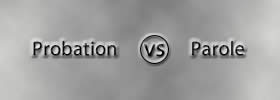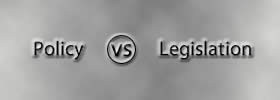Politics & Government
|
Kidnap refers to a confinement without holding the legal authority to do so, whereas hostage refers to a person or entity which is held by a captor as a security. |
|
Stealing generally refers to the activity to take away belongings of the other without permission or legal right, whereas looting is a kind of stealing typically during a war, riot, etc. |
|
Copyright gives a person the ownership and rights over an original piece of work. A trademark is a recognizable sign, design or expression which is associated with a brand. Trademarks can also be just a word, a phrase, symbol, design or any combination herewith. |
|
Breaking news refers to an important current event that due to its importance interrupts the current program and the details of the event are reported whereas flash news is a small snippet of an important current event that interrupts the current program. |
|
Probation refers to condition when a criminal serve sentence in the community rather than in prison whereas parole can be described as a conditional early release from prison and serve in the community. |
|
The Reserve Officers were originally created as part-time forces that could be helpful during war times. Regular Officers are officers that are on active duty. A Regular Officer has a better chance of being promoted, can serve longer and cannot be involuntarily let go. A Reserve Officer is not offered the same benefits. |
|
‘Secret’ classification is applied to documents that could cause ‘serious damage’ to national security if it becomes available to the public. These documents require serious clearance, which includes background checks, release forms as well as Non-Disclosure Agreements (NDA). The ‘Top Secret’ security clearance is a higher level security clearance compared to ‘secret’ and is considered to cause ‘exceptionally grave damage’ to national security if information is available to the public. |
|
The Vidhan Sabha or Legislative Assembly is the lower house in the six states that have a bicameral legislature or the sole house in the rest of the unicameral states. The members of this house are the direct representatives of the people of the particular state and are also elected by the adult citizens of that particular state. The Vidhan Parishad or the Legislative Council is the upper house in the six states that have a bicameral legislature. The members of the Vidhan Parishad are elected by members of the government, including the President. |
|
Laws are actually rules and guidelines that are set up by the social institutions to govern behavior. These laws are made by government officials. Laws must be obeyed by all. Laws set out standards, procedures and principles that must be followed. Justice is a concept that is based on equality, righteousness, ethics, morality, etc. This concept states that all individuals must be treated equal and the same. The term justice is a huge part of law and almost all aspects of law are based on this concept. |
|
Laws are actually rules and guidelines that are set up by the social institutions to govern behavior. These laws are made by government officials. Laws must be obeyed by all. Laws set out standards, procedures and principles that must be followed. Equity is a branch of law that was developed as a supplement to the strict statutory laws that may provide too harsh punishments. In layman’s terms, equity is a part of law that decides punishment on the basis of justice and fairness after looking at all aspects of the punishment, including the motive of the accused. |
|
Common Laws are laws that have come about of been enacted based on court rulings. These laws are developed based on rulings that have been given in older court cases. Common laws are also known as case law or precedent. Equity is a branch of law that was developed as a supplement to the strict statutory laws that may provide too harsh punishments. In layman’s terms, equity is a part of law that decides punishment on the basis of justice and fairness after looking at all aspects of the punishment, including the motive of the accused. |
|
Acts can be classified as two things: a document that records a fact, something said or something done. It can also be known as a law or statue that has been enacted by the government. Acts are basically rules that have noted down a piece of paper. Ordinances are laws that are passed by lower-level jurisdictions in a country such as municipal government. The municipal governments include city, town, village, borough and county governments. Municipal governments have been provided with the power to enact laws through a statute and state constitution. |
|
Laws are actually rules and guidelines that are set up by the social institutions to govern behavior. These laws are made by government officials that in some countries are elected by the public to represent their views. In simple terms, laws are basically things that a person can and cannot do. Ordinances are laws that are passed by lower-level jurisdictions in a country such as municipal government. The municipal governments include city, town, village, borough and county governments. Municipal governments have been provided with the power to enact laws through a statute and state constitution. |
|
A policy is a document that outlines what a government is going to do and what it can achieve for the society as a whole. It also outlines any and all methods and principles that the government or any entity, for that matter, will use to achieve its directive. Legislation is another term meaning statutory law. These laws have been enacted by a legislature or the governing body of a country. Legislation can also mean the process of making the law. |
|
Legislation is another term meaning statutory law. These laws have been enacted by a legislature or the governing body of a country. Legislation can also mean the process of making the law. Regulations can be used define two things; a process of monitoring and enforcing legislations and a written instrument containing rules that have law on them. |
Pages
 |
 |
 |
 |
 |
 |
 |
 |















